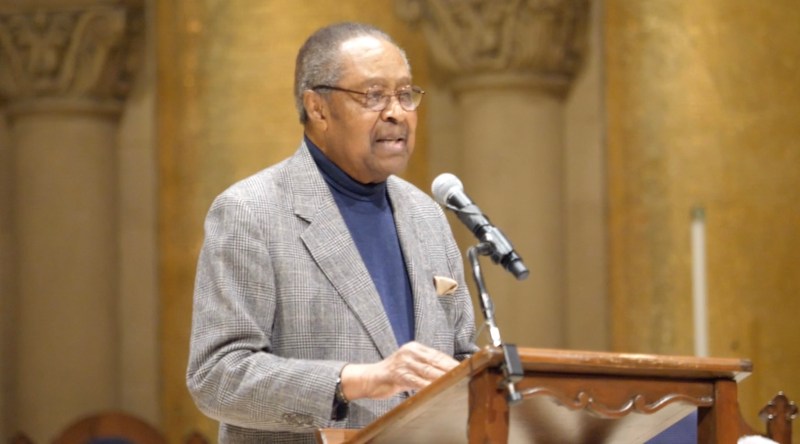The Martin Luther King, Jr. Research and Education Institute at Stanford organized several events over the weekend to celebrate and honor King’s achievements. The highlight of the schedule occurred on Thursday: the presentation of a brand-new, high-quality recording of King’s speech “Beyond Vietnam.”
A rainy evening did not prevent over 200 people from gathering at Memorial Church on Thursday to listen to a newly discovered recording of King delivering his famous anti-Vietnam War speech at the Riverside Church in Manhattan. The event also featured an introduction from Clarence B. Jones, former legal counsel and speechwriter for King.
The King Institute, which also organized the inaugural Gandhi-King conference in October, celebrated the King holiday on Friday from 2 to 5 p.m with an open house to honor King’s life.
The Thursday night event opened with remarks from Rev. Dr. Tiffany Steinwart, dean for religious life at Stanford, and Dr. Clayborne Carson, director of the King Institute, about the importance of “Beyond Vietnam.” The speech, subtitled “A Time to Break Silence,” called on the government to end all bombing in Vietnam and instead “remove those conditions of poverty, insecurity and injustice which are the fertile soil in which the seed of communism grows and develops.”
Jones, who knew King closely as his personal lawyer and one of his speechwriters, talked about King’s time in the civil rights movement. He emphasized the importance of King’s later years, when the young pastor broadened his focus from the anti-racism of “Letter from a Birmingham Jail” to the anti-war, anti-consumerism and anti-poverty messages evident in “Beyond Vietnam.”
“If you want to bookend his life by two speeches, it’s 1963 about Birmingham and it’s April 4, 1967 about Vietnam,” Jones said to the audience.
Jones said that King’s Vietnam speech alienated many of King’s moderate supporters and led him to be branded as a radical.
“King became a pariah,” Jones said. “He came under a cascade of public attack and every major civil rights group turned on him because they stick to civil rights — don’t branch into Vietnam.”
Only 10 days after “Beyond Vietnam,” King gave a speech titled “The Other America” at Memorial Auditorium at Stanford. The speech also touched upon the Vietnam War and tied it to the fight against poverty in America. King argued that the money being poured into the war was coming at the cost of efforts to achieve social and economic equality.
Truman Chen, research and administrative assistant at the King Institute, said he had been planning the Memorial Church recording for many months.
“The crazy thing is that we didn’t know about [the recordings] until October,” Chen said. “We were in New York and we got contacted by the Riverside Church there and they had all these wonderful recordings and they wanted to be in collaboration with us. We heard it and we knew from that very moment that this was going to be our King holiday celebration.”
Chen said that the audio recording unveiled at the event was unlike anything else, a pristine recording of one of King’s most important speeches that deserves to be heard by many more in the years to come.
Carson said that listening to the audio in Memorial Church made it feel alive.
“How could you be disappointed in a speech by Martin Luther King, hearing it in a way that only people who were there at the original event would have heard it?” Carson said. “No one’s heard it this clearly and this much fidelity in all the 50 some years since then. To hear it in a church and to hear it the way he delivered it, I thought it was a very special occasion. It shows what it means to make a document come alive.”
Chen made a case for the continued relevance of the speech.
“Back in October we didn’t know the American government would be escalating tensions abroad and talk of war is coming back and that really speaks to the foresight of King’s speech,” Chen said. “I think the event couldn’t have been better, I can’t really ask for anything more. My only hope is that people walk away from this thinking and it changed them to some degree.”
Contact Ujwal Srivastava at ujwal ‘at’ stanford.edu
